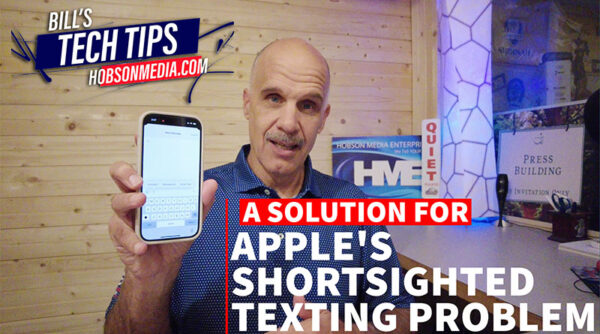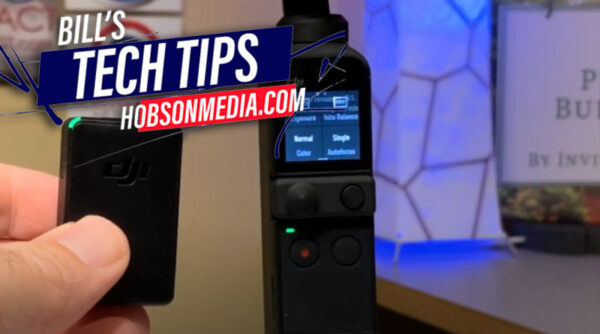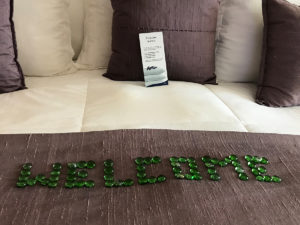 Raise your hand if you’ve joined the chorus of those bemoaning the absence of quality service and attention to detail in far too many walks of life. You’re not alone.
Raise your hand if you’ve joined the chorus of those bemoaning the absence of quality service and attention to detail in far too many walks of life. You’re not alone.
As our society dives deeper into apps, gadgets, and screens, simple courtesies and excellence in the “little things” have gone the way of the dial-up connection. What once was common is now absent as personal communication has become impersonal.
From business transactions to everyday interactions, we’ve become lazy and impersonal to the point that anyone excelling in the “little things” now stands out from the crowd as if they were filled with neon and placed in the middle of an unlit field at midnight.
Thankfully, there are still pockets of resistance to the trend. We recently enjoyed a getaway to a very special destination where the practice of “special touches” has been perfected and provided a poignant reminder that with a little effort, the customer/donor experience doesn’t have to feel like the equivalent of a root canal.
What intentional things are you doing that marks your business or non-profit as a cut above those in competition with you?
DOING IT RIGHT
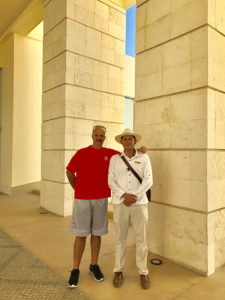
I’d never before seen an email like the one I received 48 hours prior to our departure. It came from “Aldo, your Personal Butler throughout your stay with us at The Towers at Pacifica.” His message included a form where we were invited to indicate our personal preferences for everything from type of pillow to choice of in-room snacks and beverages. (Little did we know at the time, but everything on that pre-arrival list would soon begin to magically appear in our room each day.)
What was already an exciting adventure to a new destination for my wife and I suddenly became even more interesting. I knew we were bound for a gorgeous resort and stunning Jack Nicklaus golf course in Los Cabos, but that introductory message set the tone that this was to be no ordinary trip.
You’ve seen the brochures and websites for destinations where a few creatively staged photos produce a faux aura of excellence that quickly evaporates the moment your key slips in the door of a substandard room. But the introduction we had to Pueblo Bonita in Los Cabos was more than just an enticement and teaser that we were about to visit a unique place – it was a reminder that adding small, intentional, personal touches is something every organization can and should do on a constant basis.

7 STEPS TO IMPROVING THE “LITTLE THINGS”
Staff Training – The fact that you chose to hire someone doesn’t automatically mean they are well-versed in the keys to effective personal interaction. A well-educated, highly motivated person may not know the importance of essentials like eye contact, focused attention, active listening, etc.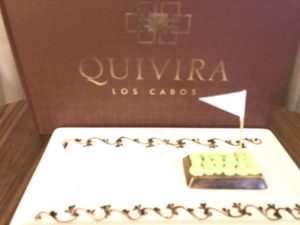 Taking time to train your staff is NOT simply a matter of ensuring they know how to clock in/out, find the break room, and park their cars away from the entrance. Effective training lays the foundation for basic expectations as emissaries for the organization.At Pueblo Bonita Pacifica (PBP), every request for assistance or directions was met with a staff member literally walking us to the desired location. They didn’t point, they led. They didn’t mumble, they spoke clearly. They didn’t look put out by the interruption, they readily assisted. This is a result of training and it makes a powerful impression.
Taking time to train your staff is NOT simply a matter of ensuring they know how to clock in/out, find the break room, and park their cars away from the entrance. Effective training lays the foundation for basic expectations as emissaries for the organization.At Pueblo Bonita Pacifica (PBP), every request for assistance or directions was met with a staff member literally walking us to the desired location. They didn’t point, they led. They didn’t mumble, they spoke clearly. They didn’t look put out by the interruption, they readily assisted. This is a result of training and it makes a powerful impression.
Actual Listening – At some point, you’ve been on the receiving end of the “how’s it going?” drive-by question. You knew at the very moment that your answer was completely irrelevant. The insincere inquiry meant nothing to the person asking it because they barely broke stride and didn’t flinch when you tested out a preposterous answer like “not bad…only killed four cute puppies this morning.”Truly listening is a lost art. It requires intent, attention, care, and it’s a nice touch if you could stop texting while we’re talking. At PBP, every interaction we had with Aldo was a slice of time when we had his full attention. Keep in mind, we were not the only guests Aldo was serving. He had several others and would have been justifiably distracted at times – but he wasn’t. His training led him to lock in and listen in to the conversation he was having, not the other things happening nearby.
 Taking Pride in the Product – Our PBP visit was part of a media group trip to the resort. As host of Michigan Golf Live and Fore Golfers Network, we occasionally receive invitations to wonderful destinations so we can share the stories with our audience. Our trip was very special, highly organized, and filled with unique moments – including each meal.As we sat down to lunch and dinner each day, each course of the meal was prefaced by the chef stepping into the dining area and describing the food we were about to enjoy. He was (rightfully) proud of the thought and effort that went into the culinary perfection being presented. It was a great reminder of the value of taking pride in your work and in your product. Wouldn’t it be a powerful moment to have your staff publicly explain why they were proud of their work? Think about how that concept could play itself out in your organization, especially among staff who might think what they do doesn’t make a difference.
Taking Pride in the Product – Our PBP visit was part of a media group trip to the resort. As host of Michigan Golf Live and Fore Golfers Network, we occasionally receive invitations to wonderful destinations so we can share the stories with our audience. Our trip was very special, highly organized, and filled with unique moments – including each meal.As we sat down to lunch and dinner each day, each course of the meal was prefaced by the chef stepping into the dining area and describing the food we were about to enjoy. He was (rightfully) proud of the thought and effort that went into the culinary perfection being presented. It was a great reminder of the value of taking pride in your work and in your product. Wouldn’t it be a powerful moment to have your staff publicly explain why they were proud of their work? Think about how that concept could play itself out in your organization, especially among staff who might think what they do doesn’t make a difference.
Excellence in Anonymity – Every organization has behind-the-scenes staff doing the little things that, when done properly, are barely noticed. At PBP, we frequently admired the property maintenance team working throughout the day to ensure the sandy flower beds were uniformly raked. The crisp lines they left behind provided a visual effect that reinforced the overall quality of the guest experience. These staff members fulfill their role without fanfare and yet they take pride in doing an excellent job. The next time you step into an unkempt restroom or wonder why the tables always seem to be poorly wiped down, remember the flower beds at PBP. There is great value in being committed to excellence, even when toiling in anonymity.
Thanking Your Customers – Are you truly appreciative when someone chooses to do business with you? For those involved in the non-profit sector, are you truly thankful when someone chooses to donate to your cause? As odd as it sounds, most organizations are very poor at expressing gratitude. Once the financial transaction takes place, many consider the relationship to be over – or the only communication they’ll have moving forward is to ask for another purchase/donation.If you fail to thank your customers, you’ve failed to cultivate the relationship. You’ve told them that their only value to you is monetary. You will soon lose their business. They will purchase or donate elsewhere. This is especially vital for charitable causes. It’s shocking how poorly donors are thanked for choosing to support a cause. In fact, we believe the leading cause for donor attrition is the lack of an established relationship between donor and the organization. That relationship is built through the expression of gratitude on a frequent basis.
Get Out The Pen – You want to leave an impression that once was common but now is rare? Write a note of appreciation to someone for the little things they did well. While this isn’t something a Fortune 500 CEO can do for every customer or staffer, even the most harried executive can schedule the time to write 5 notes per week…1 per day. Years ago, I learned this lesson thanks to the excellent example set by the Musser family at historic Grand Hotel on Mackinac Island. The family has operated this stunning property for several decades and each summer we host a special golf weekend for Michigan Golf Live listeners and viewers. As part of our visit, we broadcast the MGL Radio show and Mr. Musser was one of the guests. It was one of hundreds of interviews he does each summer – a highlight for me, but certainly nothing extraordinary for him.Yet, a few days later, I received a hand-written note of thanks for including him on the show. I was blown away by the thoughtful gesture and have done my best to personally incorporate the concept ever since. Those notes do make a difference!
Years ago, I learned this lesson thanks to the excellent example set by the Musser family at historic Grand Hotel on Mackinac Island. The family has operated this stunning property for several decades and each summer we host a special golf weekend for Michigan Golf Live listeners and viewers. As part of our visit, we broadcast the MGL Radio show and Mr. Musser was one of the guests. It was one of hundreds of interviews he does each summer – a highlight for me, but certainly nothing extraordinary for him.Yet, a few days later, I received a hand-written note of thanks for including him on the show. I was blown away by the thoughtful gesture and have done my best to personally incorporate the concept ever since. Those notes do make a difference!
Smiles Cost Nothing – It doesn’t matter if you’re part of the team at a hardware store, car dealership, fast food restaurant, car wash, or important charitable cause. Smile. Put away the grim look that makes people wonder if they would be better off going elsewhere and avoiding the bad day you’re clearly having.

One of my favorite aspects of our trip to PBP was the ready availability of smiles from the staff. I’m not naïve enough to think that everyone was living a perfect life, simply floating from one dream sequence to another. But their training had worked and they made each guest feel welcome and appreciated. Can you imagine such a concept being applied to the retail shopping experience you’re about to encounter?
I’m writing these thoughts in early November, the beginning of holiday shopping season. Again this year, I will do my best to continue a longstanding tradition of never entering a store to buy gifts for family. Why? The retail shopping experience is miserable. It’s a slog through a gallery of poorly trained employees with depressed expressions who couldn’t possibly care less if you’ve chosen to spend your money at the store that employs them. So I won’t. I’ll click the mouse and avoid the discomfort. Smiles cost nothing, but they sure seem to be in short supply.
All the branding and strategic planning efforts in the world can be negated by a staff that does the “little” things poorly. Many of the aforementioned points carry a hard cost of zero dollars to teach and implement and yet many organizations ignore them all, suffering as a result.
Want to see it done right? Visit Pueblo Bonita Pacifica or Grand Hotel.
Want help implementing these core concepts with your own staff? Hobson Media is happy to help. Smile included at no extra cost.

